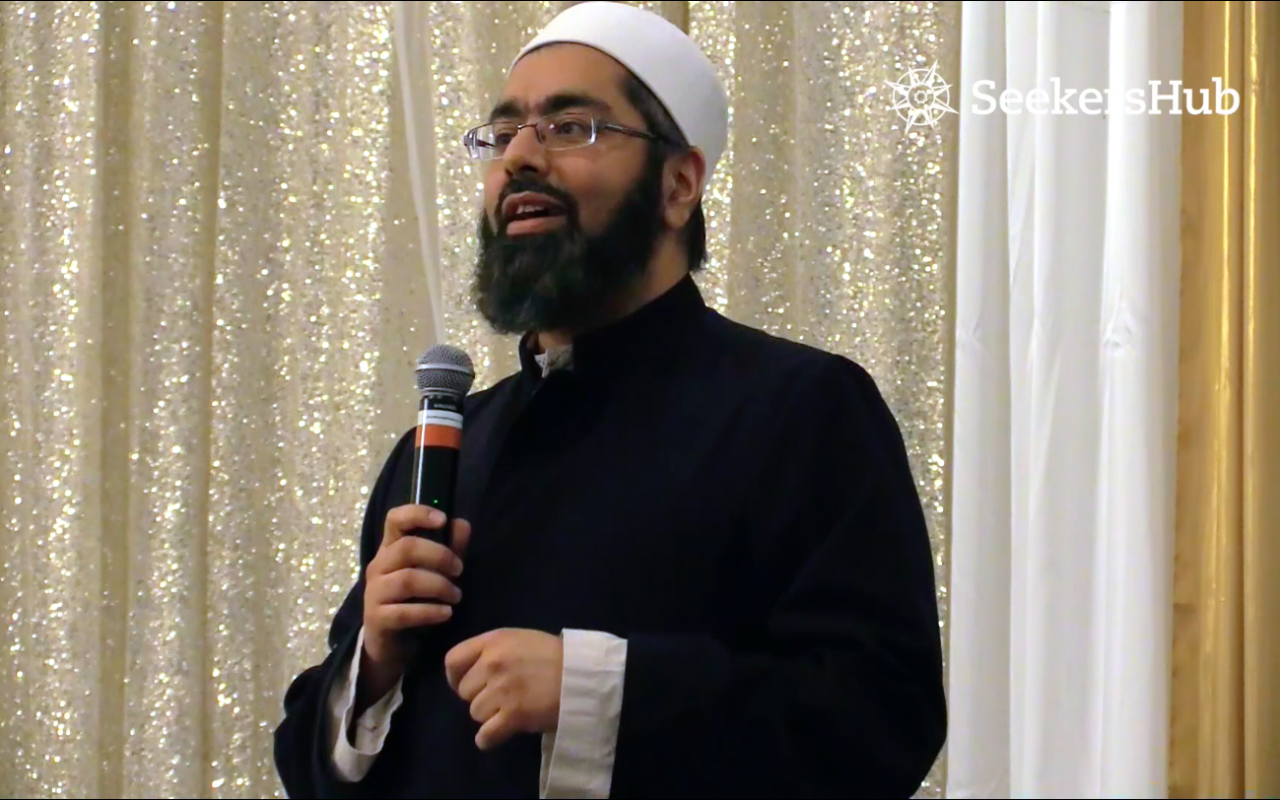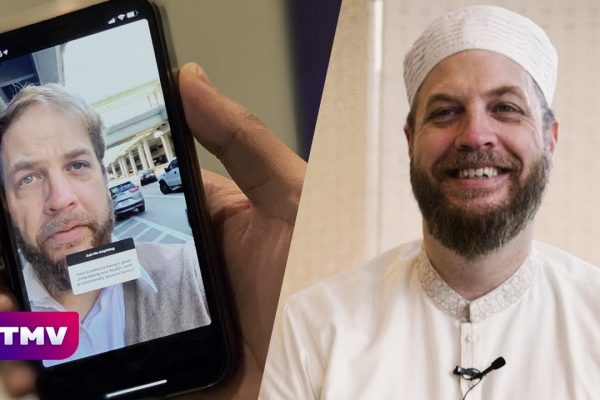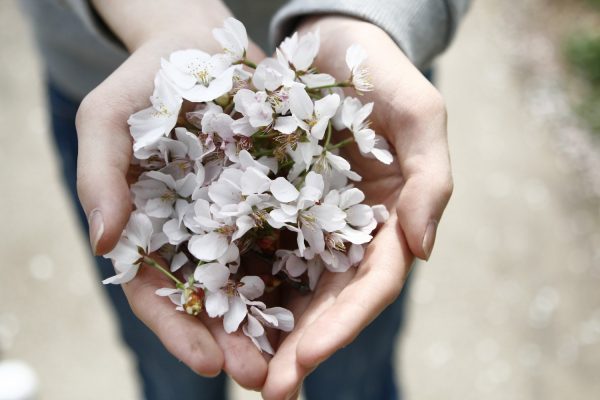 Shaykh Faraz Rabbani spent ten years studying with some of the leading scholars of recent times, first in Damascus, and then in Amman, Jordan. He returned to Canada in 2007, where he founded SeekersGuidance in order to meet the urgent need to spread Islamic knowledge, both online and on the ground, in a reliable, relevant, inspiring, and accessible manner. Since 2011, Shaykh Faraz has been named one of the 500 most influential Muslims by the Royal Islamic Strategic Studies Center.
Shaykh Faraz Rabbani spent ten years studying with some of the leading scholars of recent times, first in Damascus, and then in Amman, Jordan. He returned to Canada in 2007, where he founded SeekersGuidance in order to meet the urgent need to spread Islamic knowledge, both online and on the ground, in a reliable, relevant, inspiring, and accessible manner. Since 2011, Shaykh Faraz has been named one of the 500 most influential Muslims by the Royal Islamic Strategic Studies Center.
In this interview, he speaks about the state of shock the ummah is in, the qualities one should look for in a religious scholar, the scope and place of learning the deen online, the experiences of born-again Muslims, and the misconceptions about tasawwuf today.
There is a mainstream consensus that ‘where there are differences, there cannot be condemnation.’ Yet we see today a great amount of intolerance, where we see accusations of kufr thrown at the drop of the hat. What explains this situation?
We can say that the ummah of the Prophet ﷺ is in a state of shock. There’s been external shocks like colonialism, and the challenges of modernity and postmodernity. There have been internal shocks like the challenges of the post-colonial age, the political, economic, social, cultural, and intellectual turmoil, other factors such as oppression, disenfranchisement, secularism, and so many different things. Faced with these challenges, people get defensive, they want to hold on to their understanding of priorities. And when people get defensive, they’re afraid, there isn’t stability. Then it is not unexpected that they would be intolerance and, and hostility between groups and so on. And this is where leadership and efforts to bring believers closer together are critical.
We need to remember that there is a harmony at the existential level with all that exists. There’s a harmony with living things, with our fellow human beings. There’s a harmony with the people of ‘La Ilaha Illallah.’ We have to have to be callers to this harmony, callers to this mercy, callers to the way of love and mercy between humanity, and with all of Allah’s creation.
Seekers Guidance is a global seminary. Given that the ummah is split into numerous communities, along sectarian, linguistic and ethnic lines, what are the challenges of teaching to such a diverse group?
We do not delve into the sectarian. The Prophet ﷺ said that ‘I’ve left you on the clear wide way, so clear that its night is like its day, none will veer from it except one who destroys themselves and one who harms themselves.’ So the way we understand, the way our teachers have conveyed to us is that there is a clear sense of a mainstream. The mainstream has outward characteristics. It is embodied by the mainstream schools of Islamic theology, law and spirituality. It is a way of calling to Allah, calling to the way of the Messenger of Allah ﷺ , with uprightness, with istiqama, with mindfulness, taqwa, with love and with veneration, with mercy, with gentleness.
The focus of Seekers Guidance is to convey knowledge and guidance that we hold to be sound from this vast, broad, diverse mainstream. And to convey with consideration, with caution, with the values that we’ve mentioned. Whoever wishes to avail themselves of this, they are welcome and whoever doesn’t, they are welcome as well. Allah’s Messenger ﷺ has told us, “Your duty is but to convey clearly.” And that is the way of the prophets that we understand.
Education via the internet has become the norm today, with some courses shifting entirely online. Is the latter possible for Islamic Studies, given the traditional importance given to the teacher-student real-world interaction?
So online study is not a substitute for talaqqi, for direct study with a teacher. Some levels of connecting with teachers is possible like online mentorship, advice, guidance. But there are many intangibles in direct human connection, of seeing the example, witnessing the state, the religious attitude, the approach, the conduct, the character of one’s teacher. And that in person study and company is very critical. We see the role of our online classes as helping students connect with scholars, to get people going on the path of knowledge and to sustain them on the path of knowledge. But in general, it is not an expected norm that anyone would be able to become a scholar purely through online study. We have many cases of people who started studying online, they studied a body of texts and then they came either here to Seekers Guidance Toronto or they went to Amman or Turkey elsewhere to further their studies. Some such people may then continue online after establishing these relationships with the teachers in person.
So no, it is not in any way a substitute for direct teacher-student relations. Some level of teacher students relationships are possible through mentorship, through online connections. But that in person company is critical, it is necessary for the complete Islamic educational experience.
I want to add a related question to that. What are some qualities students should look for in a religious scholar, both online and offline, before they seek education from them?
The scholars of hadith and also the scholars of fiqh have talked about uprightness as having two aspects, an outward uprightness and inward uprightness. We could take a corollary of that to look for a religious scholar to study with. One, one has to verify that their outward knowledge is sound, that the knowledge they’re conveying is through actual study with qualified scholars. That they’re authorized to convey what they’re conveying. Number two, that their current understanding corresponds to the parameters of mainstream religious understanding in Imaan, Islam and Ihsan, in faith, practice and spirituality. Outwardly also that this is a person of established uprightness, that reliable scholars approve of this person as being a teacher worthy of taking knowledge from.
So the uprightness is a very important matter. And then the inward aspect is that their character manifests caution, which is a central Islamic value, that they have a concern for taqwa, good character, mercy, gentleness, that they think well of fellow believers. And that there are no signs of worldliness. In this, one of the safe things is to consult, right? Always observe and consult before committing.
Your journey to teach the ummah began with SunniPath (now qibla.com). It now flourishes with Seekers Guidance. In hindsight, what is your own assessment? The goals you began with, the present state, the future challenges?
There is an urgent need to spread Islamic knowledge and to spread religious guidance. That’s what I have strived for, as best I can to dedicate myself to. At some level, I may have sacrificed some of my personal knowledge aspirations, for the broader concern of being part of an effort to establish lasting institutions of Islamic knowledge. And that’s where my teachers have pointed me towards. Now, for example, I don’t answer many questions for answers service, but we have a whole host of teachers who do. And I oversee that process.
There is a need to spread religious knowledge and guidance. There’s a need to institutionalize reliable knowledge and guidance. There is a critical need to support the most worthy scholars so that they can dedicate themselves to spreading reliable knowledge and guidance. And there’s an urgent need to sustain and to support the most deserving students so they can become the worthy scholars who will teach future generations. That’s where one of the most important projects of Seekers is the Islamic Scholars Fund.
In an earlier time, we had the city mosque not only as a praying space but rather host to a whole lot of activities. There were forums for discussions, there were markets around the mosque, there were community gatherings, in short, it was the nucleus of community life. In the present day, what is the place of the city mosque? How can it be utilized further for the community’s benefit?
That may be a rather idealized presentation of the mosque. The mosque is a place of worship. It has a primary function. Mosques were part of integrated communities. The central mosque would be in a nodal point in a neighbourhood, in a quarter of the city or in the heart of the city itself, depending on the size of the city. So naturally the larger mosques would be in nodal points where the marketplace would be there, other activities would be around there.
However, we have to be cognizant as well that mosques were not the primary place for religious education. For example, we had mosques, but we also had madrasas. So the primary place for formal religious education would be madrasas, though some scholarly and general teaching would take place in the mosque. Zawiyas or khanqas emerged, which were places whose primary focus was spiritual education, though some spiritual education and even some spiritual gatherings would take place in mosques. There were other kinds of forums for other matters, and some of those could and would take place in and around the mosque.
So the mosque has to be part of a community. There is a case for specialization, that mosques should be run to be welcoming places of worship. Like counselling doesn’t need to take place in a mosque, but counselling needs to be connected with the mosque so that if someone comes to the mosque and they need counselling, they can go to the requisite service. How the functions of the community are distributed between the mosque itself and related religious and social services, that’s a matter of community building. And different countries, different cities their considerations may differ in that.
But what we have to prioritize is that there are maqaasid of the deen, their higher aims, whose preservation is divine guidance. The Quran and the Sunnah have called the believers collectively to fulfill the collective obligations. And we have a collective obligation to preserve the religion, to preserve life, to preserve wealth and honour and intellect and so on. And each of these require their requisite institutions. And there have to be networks of healthy relations between the various societal institutions that are striving to fulfil these higher aims of religion, the higher aims of ultimate human interest.
We hear stories of reverts to Islam. Yet there are also born as Muslims, who after a period of laxity or indifference, discover their faith and ‘renew’ it, are ‘reborn.’ In your long-time as a community leader, what has been your experience with such Muslims?
The world’s a diverse place. People have diverse journeys. There are many people who struggle in life, drift and they reconnect. And, the people of the spiritual paths say that what counts is not who came first. What counts is who is most true. That’s why the Prophet ﷺ defined religion as sincere concern. You will find trueness, sincere concern, sincerity amongst converts, amongst those reborn or those who are raised with a wholesome upbringing.
We do not choose our circumstances, but we do choose how we will respond to those circumstances, as the Sunnah of the Prophet ﷺ makes clear. And part of being a servant of God is to know where Allah has placed you and what Allah is calling you to in turning to him.
Today, there are misgivings about tasawwuf, with some going as far as to declare it a heresy alien to Islam. Yet earlier texts, such as Imam Ghazali’s, insisted that true spirituality is not different from sharia, rather upholding the sacred law with excellence. What explains the distrust of tasawwuf in today’s times?
What is religion? The religion is what you believe, how you practice what you believe, and striving to be sincere in both your belief and practice. What you believe is Imaan. And that’s the science of beliefs. Your practice is governed by fiqh at the level of basics and at the level of excellence, outwardly. And sincerity in faith and practice. That is Ihsan, spirituality. The Sunnah understanding of spirituality in its method and aims is an intrinsic part of our religion.
Any distrust in some quarters toward spirituality is not a historic phenomenon. Whether we call it tasawwuf or other names, this has always been a part of history. However, much of the causes for the distrust of spirituality can be assigned to false claimants of tasawwuf, those whose practice of tasawwuf is not firmly rooted in knowledge of the religion and upholding of the Sunnah of the Prophet ﷺ.
The earliest Imams of the spiritual path said that if you see someone leaving even a simple Sunnah of the Prophet ﷺ, then take no spiritual teachings from them. Spirituality is striving to uphold prophetic teachings in the very best possible way. So any understanding of tasawwuf that is not deeply rooted in Sharia and Sunnah is an imitation. It could be harmless imitation, but could be a very harmful imitation. So many people claim spiritual realities. But if they’re not grounded in knowledge of the Sharia, in knowledge of aqeedah, of Islamic beliefs, in knowledge of fiqh, knowledge of the Quran, of the Sunnah; if their practice does not correspond to orthodox understanding and practice of faith and law, then that is very dangerous.
Anyone who contravenes the sharia has nothing to do with tasawwuf.

Imam Ghazali wrote that ‘the laymen and the ordinary people who are engaged in crafts and trades should be left alone in the integrity of their beliefs which they have accepted when they were instructed in the faith which we have already stated. To teach them disputation is decidedly harmful to them as it will perhaps arouse doubts in their minds which will shake their belief. Once these doubts are aroused it will not be possible to remedy their shaken belief’ (The Foundations of the Islamic Belief). In today’s hyper-connected, information-overloaded age, is it still possible to follow this advice?
Yes, it is very possible. Today, there is information overload. You can call it the ITSS, Information Toxic Shock Syndrome. There’s a few hadith of the Prophet ﷺ that give us a framework by which to inoculate ourselves from harm. One is ‘be avid for what benefits you’ said the Prophet ﷺ in the hadith of the strong believer. Secondly, the Prophet ﷺ said that ‘From the excellence for a person’s Islam is to leave that which does not concern them.’
The Prophet ﷺ also said to his grandson, Al Hasan Ibn Ali, ‘Leave all that would make you doubt for all that would not make you doubt’. The Prophet ﷺ said, ‘that the lawful is clear and the unlawful is clear, between them are unclear matters that most do not know about. Whoever avoids the unclear safeguards their religion and their honour. And whoever falls into the unclear falls into the prohibited.’
So guard your attention. Act purposefully. Read things purposefully. The way to navigate in the stormy seas of the information age is to sail with purpose and resolve and not to drift, because if you drift, you just let go and let the tides take you. You may drown. You may sink, you may just go in circles. You may drift into the rocks, but you won’t get anywhere. So if there are disturbing things, if there’s controversy, if there’s gossip, is there reward in following up on controversy? No. Can you do something about it? No. Anything that will not count for you on the Day of Resurrection, don’t do it. If someone is being harmed, if you can assist, assist. Pray for them, give in charity. If you cannot help them, move on. Mind your own business. Your own business is rather urgent.
Islam informs us that this life is a test, a trial full of hardships. The mercy is that life is short, temporal and of a fleeting nature. Has our this-worldly focus, our materialism, our disconnect from the real purpose of our earthly life made us forget this?
No, the believer doesn’t see tests as difficult, right? If you look at the believer, one who sees with the eye of faith, sees, as the Prophet ﷺ said, ‘how strange are the affairs of the believer, for their affairs are only for their good, and that is for no one but the believer.’ If pleasing things happen to them, they are grateful, they have Shukr and that’s where they’re good. If difficult things happen to them, if trials befall them, they are steadfastly patient and that too is for their good.
And we understand trials are not difficult, are not difficulties. In reality, trials come with ease as Surah Alam Nashrah tells us, ‘truly with difficulty comes ease’. Ease doesn’t come after difficulties, ease comes with difficulty. You just have to see it.
Everything that happens to the believer is a means of taking another step on their path of closeness to Allah. It’s a test. The point of the test is not the fact that the questions are tough, it is the fact that if you answer correctly, you will pass, you will succeed.
Abu Bakr Shibli for example, defined what is patience, what is sabr? He said to face even ruin cheerfully. For the believer, even if the worst of things are happening, it’s all a reward, right? So as Ibn Ata Allah said, ‘if you behold Allah’s giving in his apparent withholding, then the withholding becomes from giving itself.’
We see an environment of active Islamophobia around the world. What is the Prophetic guidance on dealing with such a situation?
Read the Seerah. The whole Quran tells us, the stories of the prophets are stories of how to respond to Islamophobia. Seek the pleasure of Allah. How do you respond to anybody? Seek Allah, seek his pleasure. That’s the answer. Allah tells us ‘respond in the way that is best’. And what is the way that is best? The way that is most likely to be most pleasing to Allah. We keep reading the life of the Prophet ﷺ, how did he respond? Know what you need to do, like how will you be a caller to Allah, an ambassador of love and a master of mercy and ambassador of truth, an ambassador of justice, an ambassador, of beauty. Have an answer for that and stick to it.
Serve, serve the way of knowledge, the way of guidance, the way of justice, the way of service to others. Seek Allah’s pleasure. Uphold the Sunnah values in all of this. Don’t keep staring at the darkness, turn to the light. Imbue the light, embody the light. Call to the light, spread the light, respond with light. You will see that there is nothing but light. If truth is manifest, if the light of truth is manifest, darkness fades away.
You spoke of spirituality ‘as making one’s heart for Allah alone.’ This is aided by ‘routines of remembrance.’ (dhikr) What are some practical tips to inculcate this in our everyday life?
The Prophet ﷺ said ‘strive for complete uprightness, but you will fall short. So remain steadfastly committed.’ Set goals, strive for complete uprightness. Have a standard which is the Sunnah, that ‘I want to bring the Sunnah into my life completely.’ But you keep falling short. So what do you do? Remain committed. So keep working on bringing the Sunnah into your life. How? Learn with the intention of acting on your knowledge with sincerity. Remain steadfast and committed. Do the best you can. So take on, a little at a time, make it consistent, and then add a little more. Make it consistent. And be of glad tidings. Rejoice. Always thank Allah. Behold Allah’s blessing and favour upon you.
It’s a gift to be alive. It’s a gift to be a human. It’s a gift to be a believer. It’s a gift to have guidance. It’s a gift to have every breath and in every breath that you take, it’s a gift that you can turn to Allah.
Practically there’s no book I can recommend more highly, besides the revelation itself, than Imam Al Ghazali’s ‘Beginning of Guidance.’ Strive to live that book consistently, gradually and, and keep going back to it until it becomes your lived reality. Shaykh Yahya Rhodus is a dear friend, teacher, someone I look up to, admire and have known for over a decade closely. He teaches it at Seekers. It’s a free course that we have in two parts. If you want to, to live, to bring the Sunnah into your life practically, the ‘Beginning of Guidance’ has the first keys. Take that seriously, and then the next step is Imam Al Haddad’s work, ‘The Book of Assistance’, which Shaykh Yahya also teaches in a few parts. It is another very practical book. But the purpose of spiritual knowledge is not like popcorn. It’s to live and to be transformed by Allah. May Allah realize us in these realities.





